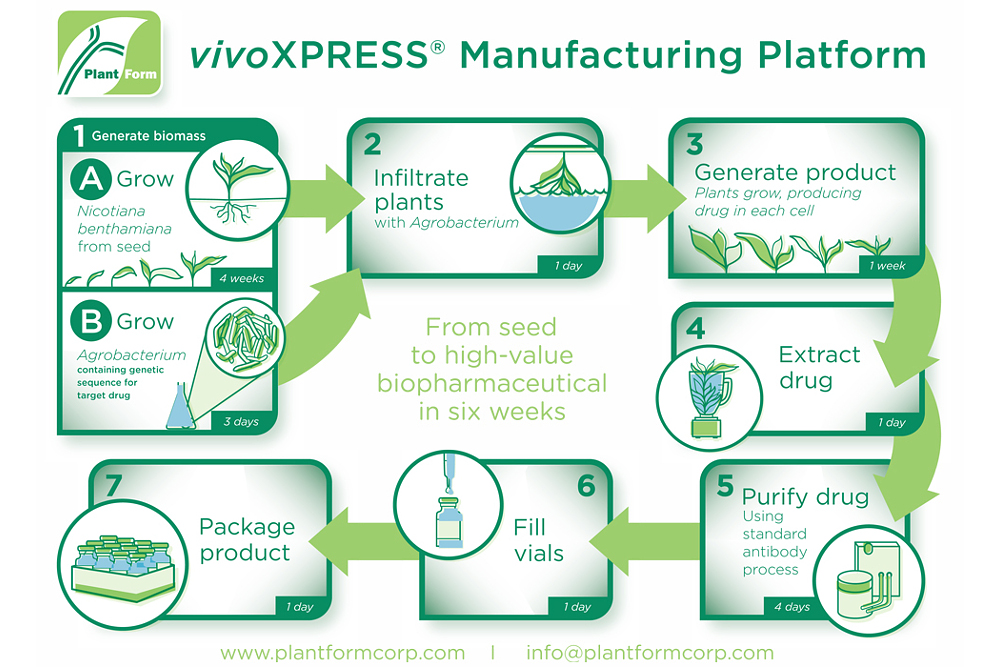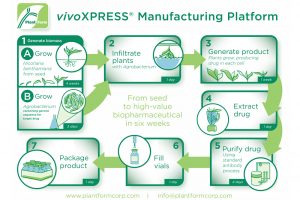01:19 – About PlantForm
05:36 – Incredible Covid-19 innovations
08:00 – Connections and partnerships
09:37 – Estimated time to market and deployment goals
13:20 – The positive outcomes of development to date and reflecting on R&D
15:39 – How to keep up on PlantForm’s progress
Click the “Connect” tab to browse web/social links …
Website: www.plantformcorp.com
LinkedIn: www.linkedin.com/company/plantform-corporation/
Facebook: @PlantFormCorp
Twitter: @plantformcorp
Jason Bavington (00:02):
Hey everyone, it’s Jason with DUX — Your Local City Guide and welcome back to another episode of our video blog. You know, I’ve had so much fun over these past few weeks interviewing people who are doing creative and ingenious things in the business community. People who have been doing really, really remarkable things and all about connectivity and community building in the organization community and there’s also a whole bunch of industries that are doing really creative, ingenious and now revolutionary things that are really helping to address the Covid situation and bringing their insight, bringing their expertise, bringing their knowledge to the forefront as a significant contribution to the greater community as we navigate our way through the whole Covid-19 situation. Now to this end, I have Don Stewart, President and CEO of PlantForm on the call today. Welcome Don!
Don Stewart (00:56):
Hey Jason, great to talk to you.
Jason Bavington (00:57):
Nice to meet you. I’m enjoying your artwork in the background there.
Don Stewart (01:01):
There you go. It’s by a local artist, Rebecca Last.
Jason Bavington (01:05):
Shout out to Rebecca Last. We’ll put a link to her in the blog later. So we have Don on the call today and Don’s going to chat out with us a little bit about PlantForm and what they’ve been doing in the current situation, but we’re going to actually back up a little bit and, Don, why don’t you tell us a little bit about PlantForm and, you know, what you’ve been up to prior to Covid-19.
Don Stewart (01:25):
Yeah. Great. So, our company PlantForm in the pre-Covid days was focusing on developing therapeutic drugs and tools for diagnostic assays to help understand medicine and actually primarily bring low-cost medication to countries where there’s need. We developed low cost versions of existing drugs and have a joint venture in Rio de Janeiro in Brazil to do that. And we’re developing a relationship in South Africa as well with the company there. So what we do is we use a technology called “biopharming”, which is the use of plants to produce drugs. So we’re not actually making natural products from plants, we’re using plants as bioreactors and we can grow them to produce these drugs that we want, the copies of existing drugs. And also very interesting different area, which is making countermeasures to bioterrorism.
Jason Bavington (02:27):
Wow. That’s pretty crazy. You have quite a few neat things on your plate. And so what’s the typical markets for the products and solutions that you create? Where do your expertise end up?
Don Stewart (02:40):
Yeah, so our expertise as a company is in the development of the drugs. And what we’ll do is we will partner with large pharmaceutical companies to get them to use their expertise to bring them into the markets. And so we’re developing drugs for the South American markets with our partner in Brazil, for the African markets with our partner in South Africa. And we’re also developing drugs for Europe and North America. And that’s funded by investors and governments as well.
Jason Bavington (03:16):
Okay. And you have a pretty cool setup at your end, I understand. Let me just share my screen with everyone and just head over to your bio farming. So maybe tell us a little bit what, like what are we looking at here in this pretty picture.
Don Stewart (03:29):
So what we’re looking at here is a greenhouse that’s growing a strain of tobacco called the “Nicotiana benthamiana”. So don’t smoke this because it’s got very little nicotine in it so would be very disappointing. But what we do is we use these little plants. So they only grow about 15 or 18 inches high, which is much shorter than tobacco for cigarettes, which grows about two, two metres, like about six feet high. So we grow these indoors and we can put genes into them that produce the products that we want and using natural process of light and just plant growth, we can actually produce therapeutic drugs. It’s a very low cost and very efficient way of doing this. And if you slip onto our Science and Technology page, I can tell you a little bit more about how this works.
Don Stewart (04:19):
Here we’ve got a picture of Ashley. If you flip on to the Manufacturing Process part on the tab. There we go. It will show us a little bit about how this works. It’s actually pretty simple. So we grow the plants for four weeks. And then what we do is we introduce a gene into them by a system called “Infiltration”. And then we grow them for another week which is a number three in this diagram. And the plants actually produce a product that we want, which we extract, and then we purify and we make into a pharmaceutical substance. So we’ve got a process here that takes a total of about six weeks. It’s very economical and very green process using plants and minimum sort of input of chemicals.
Jason Bavington (05:09):
That’s great. And I love the idea how you’re using plants as the medium to grow the products that you need and makes a very natural and non-synthetic kind of way. So I can see how it’s very effective and you get to enjoy a lot of sunshine, it looks like, too.
Don Stewart (05:23):
I guess. Well, that’s why you need partnership in South Africa and Brazil. So you’ve got somewhere to go into the winter.
Jason Bavington (05:30):
Very true, very true. These kinds of opportunities are always very, very valuable. So tell us a little bit about what PlantForm is now doing amidst Covid-19 and all the innovation that you’re bringing to the world right now.
Don Stewart (05:45):
So there was a dramatic change in our focus in January because, you know, we feel there’s a need to use our type of technology to develop therapeutic drugs to address Covid. And also diagnostics. So our project that we’re working on that’s most advanced is to produce a reagent that’s used in diagnostic kits. And this is for people who’ve had Covid and are recovered. So it’s what they call the “antibody tests” or “seriallogical tests”, following the disease. And it lets you follow people and see how they might progress in terms of their recovery, whether they will maintain immunity to the virus over time and it’s become a very important task going forward. So we’re actually collaborating with a group in South Africa on this project and a couple of local companies in Guelph and Toronto as well. And then hoping to do manufacturing at larger scale with a company in Quebec. So we have international relationship, but we have a complete capacity within Canada. So that’s our first project. And it’s moving along quite nicely.
Jason Bavington (06:59):
Nice. So what kind of organizations or businesses would be able to take advantage of this product, you know, once it reaches market? What sort of opportunities are available to you there and how does it benefit companies and organizations on a whole?
Don Stewart (07:13):
Yeah, so what we’ll do is with our partners, we’ll actually produce a diagnostic kit and that kit will be initially tested and sold in Canada. But as we expand capacity, we intend to sell it worldwide. I think it’s going to be a number of different antibody test kits required. It’s not just going to be one because it’s a complex biology. And so there’s a fairly big opportunity here actually for us to move into a new area, which is the diagnostic part, but to take advantage of the expertise of Canadian companies that already play in this game. And I think the opportunities here are tens of millions of dollars in sales coming into Canada.
Jason Bavington (07:56):
Wow. So that really helps the GDP for sure. And then how do you, you know, you’re working with people in South Africa, you have all these other connections. How do you, how did you establish these connections to begin with? It sounds like you’re already internationally well-established. Tell us a little bit about how that came to be.
Don Stewart (08:13):
Yeah, I mean we started the interaction in South Africa because we visited South Africa before Covid in January actually to talk about one of our low-cost drug products. A partnership we’re setting up there. And we met with a very nice company called Cape Biopharms touring Cape town who are similar to us in terms of their technology but have focused on diagnostics. Whereas we previously had a focus on therapeutics and really they were looking for international partners to bring the technology that they have most widely as possible across the world. And so they made their technology be available at no cost to international partners and an exciting opportunity. Very the technology originated there with the University of Cape Town and was brought through the Cape Biopharms company and our technology was originated with the University of Guelph and then we’re developing it. So it’s quite nice that two different academic groups have started things that have become companies that are now joining together to help address an international problem.
Jason Bavington (09:29):
Yeah, it’s great to see that collaboration working together and kind of evolve to, you know, a corporate-based or company-based solution. And so what’s your timeline? You know what, I’m not going to hold you to this at all, but what’s your hope for your timelines to do everything from your research and your process and your manufacturing everything out until the product is basically ready to go. How are you envisioning that folding out? What kind of timeline are you looking at, you know, months, year? You know, I don’t personally understand or can appreciate what is involved in this. So, you know, I’m the noob around here and so …
Don Stewart (10:02):
So yeah, I mean we’re on a pretty aggressive timeline here. We’re actually working on the project right now. And we would hope to have tests to see if this is going to be a viable technology in a matter of weeks, probably, hopefully a month. And then if there’s an opportunity to roll the technology out, if it works as we hope, you know we’re talking weeks or short number of months and probably with the ability to bring these tests into the market to address what they think is the second wave of the Covid virus. So we’re going through the first one, but it’s anticipated it’ll come back. So it will help with governments deciding how to let people back into the workforce, open schools. Probably some kids hoping they close the schools, but it’ll be one of the tools that we hope will be used in the coming months to help Ontario government and our Federal government to decide how to open back up the workplace and the community.
Jason Bavington (11:07):
And so what’s your goals for deploying your product and solution? Are you going to work, you know, from private enterprise? Are you hoping to engage with Health Canada or some other governmental or another organization? What’s your hopes to distribute your incredible creativity that you have to offer?
Don Stewart (11:24):
Yeah, I think what we would like to do is actually have our partnerships with private industry because there’s a capacity to be responsive and change direction. But we’ll have to work closely with Health Canada as well as the regulator because these require approval. And it’s very important that you have a test that provides the correct information, otherwise it might not be safe. So our partnership for deploying the tests will be with industry partners and national for Canada and international in other domains, but with the support of the regulatory authorities who would have to interact with very closely
Jason Bavington (12:06):
For sure. And I can see how there’d be a lot of data coming out of not only you know, your production process, but once you deploy and you start, your product starts to be used, out in the field that there’s a lot of data that can come back that you can use to refine and enhance and improve. The power is in the data, right? So the more data that’s out there, the more you have to work with to continue to enhance what you already have to offer.
Don Stewart (12:31):
Yeah, I mean that’s absolutely true. And one thing that is quite exciting for us is that we have talked about this project on the radio and there’s been some print media. And I’ve had quite a number of people approach us who volunteered to make their blood available to us to help evaluate tests that we have. People are concerned if they’ve had the symptoms, but don’t know because they haven’t been tested already, if they have had Covid. And so people are volunteering to participate in our studies and we’re very pleased to help people and we can’t do that right now, but when we’re in a position to do that, I think the general population is very supportive of trying to come to grips with the Covid problem.
Jason Bavington (13:20):
Sure. I know you’re still in the early stages. Now that you’ve, you know, been into it for a little while now, is there anything that, having looked back that you would change in terms of how you’re trying to move forward? How you’re trying to tackle this major cause?
Don Stewart (13:34):
I think one of the positives has been the development of a lot of new relationships with people we already knew. So we know lots of other companies in Canada and what their capabilities are. But something that has changed is that the companies are trying to collaborate together and try to achieve goals in the quickest way possible. Whereas before people might have looked at, you know, the value of a project purely in terms of dollars and cents. Now people are looking at these projects in the value to the wider community. And that’s how we’ve got discussions going on solutions to different parts of Covid with companies in PEI and Quebec and Ontario and Brazil and South Africa. In terms of difficulties, I think no one really knew what the impact was going to be in the early stages. So if we’d had better foresight, we would have tried to establish the ability to move Covid projects forward in a lab environment earlier than we have because we just didn’t realize that it would be necessary to shut down R&D of the type that we’re doing. And we have addressed that now with partners. But we probably could have moved forward more quickly than we did.
Jason Bavington (15:01):
Well, it sounds like you’re doing everything you can to, you know, continue your pace as much as possible, as efficiently and as effectively as possible to get your solution out there. So I celebrate everything that you guys are doing at PlantForm. It sounds like you have an amazing tool that, you know, is coming to a universe near us soon.
Don Stewart (15:19):
Yeah, we have a great team pulling this together. And that’s what’s really good that the PlantForm team has been very responsive and it’s difficult for people. They’ve got kids at home and elderly relations at home, but still they’re very committed to bringing the ideas we have forward.
Jason Bavington (15:35):
Yeah, clearly the passion and drive is there in your company. So that’s really, really great. If people want to follow along with what PlantForm is doing and keep up with your Covid product is there, can they check out your website? We can put your Twitter feed?
Don Stewart (15:49):
Absolutely, yeah. We have a website. We’re on Twitter, Facebook and LinkedIn, as well. You can follow us and we’re really pleased to do that. And you can join our mailing list if you want to get updates from us. It’s on the website.
Jason Bavington (16:04):
That sounds great! So again, it’s Jason with DUX — Your Local City Guid here today with Don Stewart, President and CEO of PlatForm, based in Guelph, Ontario. If you’re watching this video anywhere else but on our website, head on over to dux.city. Click on the blog link and you’ll find the post for PlantForm and we’ll put all the social media, all the website, all the links that you, that we can possibly put in there so you can keep up-to-date with the incredible things that are happening right here at home in Guelph Ontario. They will be on that page for you. So, Don, thank you very much for your time today. It’s really, really fascinating work that you’re doing and we look forward to hearing more about your success going forward.
Don Stewart (16:43):
Great. Jason, thanks for your interest.
Jason Bavington (16:46):
So take care everyone and keep sharing and supporting your local goodness. Cheers.






